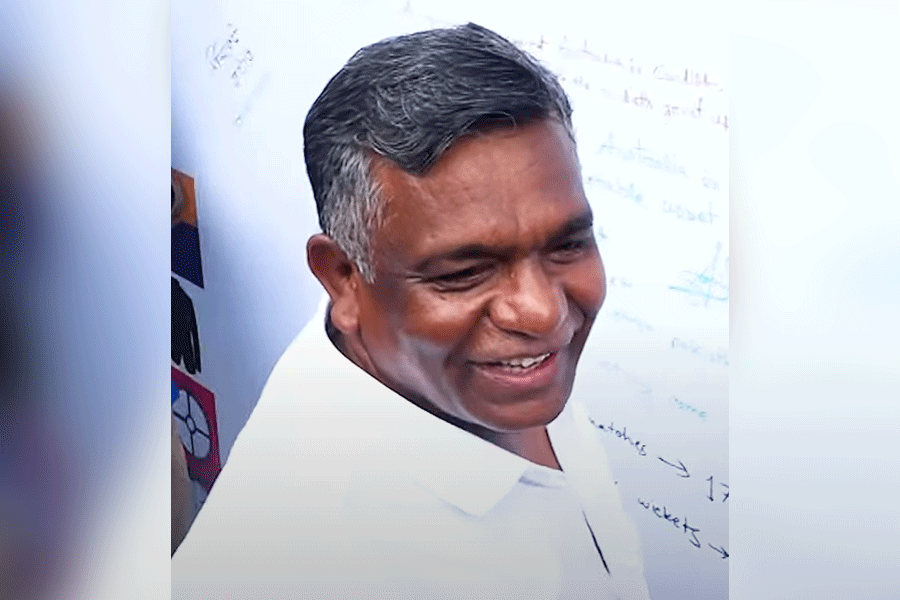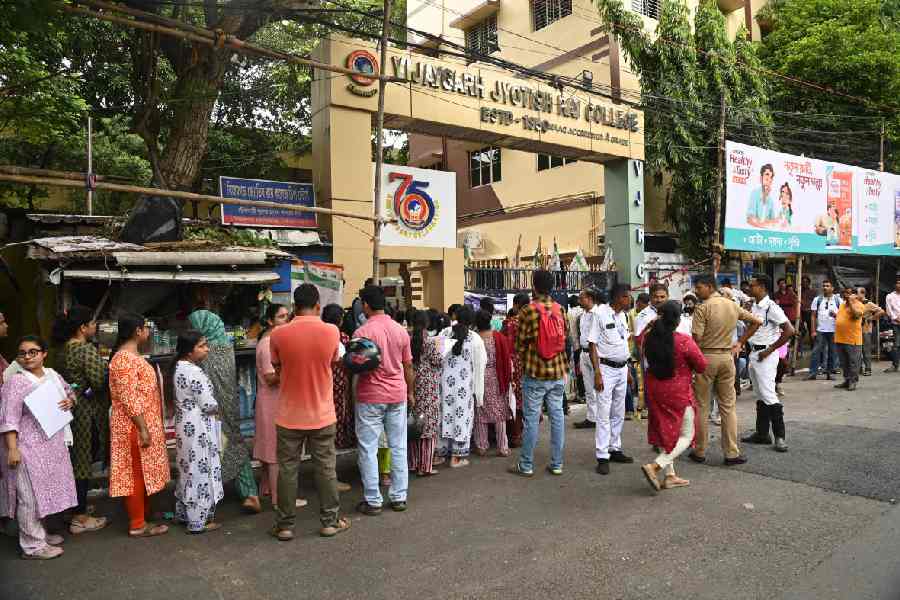New Delhi, Nov. 18: A new biography of Feroze Gandhi claims he had called his wife Indira Gandhi a "fascist" over the breakfast table in front of his father-in-law and Prime Minister Jawaharlal Nehru.
Veteran Swedish journalist Bertil Falk's Feroze, the Forgotten Gandhi (Roli Books) goes on sale tomorrow, coinciding with Indira's 99th birth anniversary.
Feroze's outburst, according to the book, came in 1959 after the Nehru administration had dismissed the communist government led by E.M.S. Namboodiripad in Kerala. Indira was Congress president that year and, according to some accounts, forced Nehru's decision.
Falk says the subject came up at breakfast in Teen Murti Bhavan, the Prime Minister's residence.
Feroze, then Congress MP from Rae Bareli, apparently told Indira: "It is not just right. You are bullying people. You are a fascist."
Nehru looked distressed, Falk writes, but an angry Indira retorted: "You are calling me a fascist? I can't take that."
In the footnotes, Falk explains he heard the account from Nikhil Chakravarty, a senior journalist and a friend of Feroze.
"Feroze told Nikhil he had protested about Kerala to Indira Gandhi and Jawaharlal Nehru and said that fascism will come to Kerala. Indira flared up and said, 'You mean I am a fascist' and stormed out of the room," he writes.
Falk, who spent several years in India, claims that Indira viewed Nehru as weak and indecisive. He quotes from a letter she wrote to her American friend, Dorothy Norman, around the time a mass agitation against Namboodiripad was peaking in Kerala.
Namboodiripad's sweeping land and education reforms had angered the Church, Muslim League and the Nair Service Society.
"He (Nehru) has given a very good lead from the beginning but he is incapable of dictatorship or rough-shodding over the views of his senior colleagues," Indira had written to Norman.
Falk says that after his breakfast table salvo, Feroze spoke at a meeting of Congress MPs in Parliament, questioning the Indira-inspired move for an alliance with the Kerala Muslim League.
"Where is the Congress? Where are the principles of the Congress? Are we going to be dictated (to) by a caste monster we have produced?" Falk quotes Feroze as saying.
"Has it (the Congress) fallen so low that we are going to be dictated (to) by communal elements, by leaders of caste and by those who enthuse religious feelings into the people and create situations where we get caught? Tomorrow, if this is allowed to continue, we might as well have (an) alliance with the Jana Sangh."
Nehru and Indira heard Feroze out attentively, the book says.
Falk, 83, claims 40 years of research behind the book, including interviews with people close to Feroze. He endorses the widely held view that Feroze was a socialist and a federalist while Indira had authoritarian tendencies.
The book quotes a friend of Indira, Mary Shelvankar, as saying: "She wanted all powers in her hands. She was against a federal India. In her opinion, India was not developed enough to be a federal state."
Falk describes Feroze as a "womaniser" but quotes several of the freedom fighter turned journalist turned politician's contemporaries as saying he was not serious about his many affairs.
In one instance, though, he says, Feroze had thought of divorcing Indira and marrying a state Congress minister's daughter he was seeing. Nehru had to depute his friend and cabinet colleague Rafi Ahmed Kidwai to persuade Feroze to end the relationship, Falk writes.
When the author met Tarkeshwari Sinha, a former Congress Union minister, she declined to talk about Feroze.
Falk quotes her as saying: "If two men have lunch together, it is okay. If a man and woman have lunch together, immediately there are rumours about an affair. This is India. These journalists write so many things."
Sinha, according to Falk, said she had once asked Indira "if she believed in all the rumours" linking Sinha to Feroze.
"I told her that I, like her, was a married woman and had a family and a reputation to guard. She answered that she did not believe in all (sic) these rumours."
Falk says Feroze differed with Indira over her indulgence of their younger son. "If Sanjay failed in class and Feroze Gandhi chastised him, his mother would come forward and say, 'Oh, no, he hasn't failed, I know there must be a mistake. I will talk to his teacher'," Falk writes.
He calls the rumours that Feroze was a Muslim "bizarre". Feroze, a Parsi, died in 1960, six years before Indira became Prime Minister.
Falk thinks that Feroze's position has been unique in the democratic world.
"How many people on earth have had the first Prime Minister of the biggest democracy in the world as his father-in-law and his wife and son as the Prime Ministers of that nation as well?" Falk asks.
Falk has written about 35 books, fiction and non-fiction, after retirement and translated mystery writers into Swedish. He has also translated and edited into English two anthologies of short stories by Swedish mystery writers.










